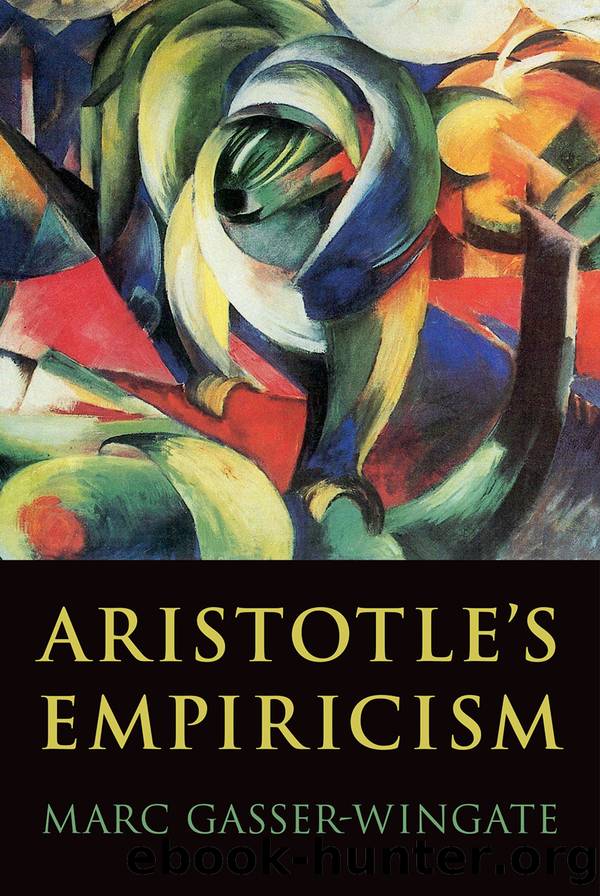Aristotle's Empiricism by Marc Gasser-Wingate;

Author:Marc Gasser-Wingate;
Language: eng
Format: epub
Publisher: OUP Premium
Published: 2021-09-15T00:00:00+00:00
4.3 Perceptual Experience and Conceptual Resources
As I argued above, Aristotle doesnât seek to explain our learning starting from some initial encounter with colors and shapes. He thinks we perceive Callias and other human beings (and in doing so perceive that they exhibit certain perceptible features), and seeks to explain our cognitive development from there. But even once we agree to this, itâs not entirely clear how we should conceive of perceptionâs contribution to the sort of inductive learning described in our previous chapter. On the reading defended above, perceiving Callias (or whatever else we perceive) doesnât itself entail the recognition of Callias as suchâthat is, a recognition of Callias that would inform our interactions with him, and perhaps serve as a basis for the beliefs we form about him. How then do we come to recognize what it is weâre perceivingÅ And how do we move from there to knowing what would explain what we perceive, or to an understanding of essences we do not perceiveÅ
Aristotle doesnât say much on these points, and what little he does say is telegraphic and confusing. He tells us, for instance, that perception leads to universal knowledge because perception itself is âof universalsâ despite the fact that we perceive particularsâso that when we perceive Callias our perception is âof human beingâ (APo II.19 100b1; cf. [24]). But this claim is problematic for at least two reasons. First, it seems to flatly contradict what Aristotle says everywhere else, which is that we perceive particulars and do not perceive universals. Second, it seems to undermine his critique of innatism. For this critique requires that perception be a basic capacityâa capacity we share with lower animals, and which yields only an unsophisticated form of knowledge. And itâs natural to think that one of the things that makes perception so basic is the particular character of its objects.34 But then itâs hard to see how this could be consistent with our having any perceptual grasp of universals: perception is supposed to be basic because we perceive particulars and particulars only, and this should rule out any perception of universals from the start.
Now, it has been suggested (e.g. by Scott (1995, 153â55)) that we should pay close attention to the phrasing of Aristotleâs remark: he tells us we perceive particulars and that perception is âof universals,â not that we perceive particulars and universals, or that our perception is of both (αἰÏθάνεÏαι μὲν Ïὸ καθâ á¼ÎºÎ±ÏÏον, ἡ δâ αἴÏθηÏÎ¹Ï Ïοῦ ÎºÎ±Î¸á½¹Î»Î¿Ï , APo II.19 100a17). What this phrasing tells us, the suggestion goes, is that any particular perceptual act has a particular object, but the capacity to perceive is nonetheless defined in general terms.35 But I donât think this can be right. First off, note that Aristotle says not only that we do not perceive universals, but also that perception is not of universals (APo I.31 88a2, cf. McKirahan (1992, 253)), and not only that we perceive particulars, but also that perception is of particulars (APo I.18 81b6). So we shouldnât read too much into the phrasing of his remark.
Download
This site does not store any files on its server. We only index and link to content provided by other sites. Please contact the content providers to delete copyright contents if any and email us, we'll remove relevant links or contents immediately.
| Anthropology | Archaeology |
| Philosophy | Politics & Government |
| Social Sciences | Sociology |
| Women's Studies |
Cecilia; Or, Memoirs of an Heiress — Volume 1 by Fanny Burney(31333)
Cecilia; Or, Memoirs of an Heiress — Volume 3 by Fanny Burney(30934)
Cecilia; Or, Memoirs of an Heiress — Volume 2 by Fanny Burney(30889)
The Great Music City by Andrea Baker(21313)
We're Going to Need More Wine by Gabrielle Union(18072)
Bombshells: Glamour Girls of a Lifetime by Sullivan Steve(13108)
Pimp by Iceberg Slim(12931)
All the Missing Girls by Megan Miranda(12747)
Fifty Shades Freed by E L James(12451)
Norse Mythology by Gaiman Neil(11883)
Talking to Strangers by Malcolm Gladwell(11877)
Crazy Rich Asians by Kevin Kwan(8349)
Mindhunter: Inside the FBI's Elite Serial Crime Unit by John E. Douglas & Mark Olshaker(7834)
The Lost Art of Listening by Michael P. Nichols(6474)
Enlightenment Now: The Case for Reason, Science, Humanism, and Progress by Steven Pinker(6405)
Bad Blood by John Carreyrou(5769)
The Four Agreements by Don Miguel Ruiz(5511)
Weapons of Math Destruction by Cathy O'Neil(5037)
We Need to Talk by Celeste Headlee(4869)
